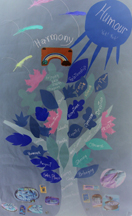The Learning Circles Project |
||
The
New Tusket Women’s Institute |
||
New Tusket is a very small place. It’s about a fifteen minute drive inland from Weymouth in Digby County, and has a population of less than 500 people. Like many inland Nova Scotia communities, New Tusket’s economy is largely divided between a small farming and forestry. The largest employer, however, is mink farming, which provides almost half the local jobs. The community is relatively stable over the last ten years, although, as in many rural areas, there is aging population. The New Tusket Women’s Institute meets in the New Tusket Baptist Church Hall once a month. On the day I visited they got together earlier, to make quilts for the IWK Children’s Hospital in Halifax. These quilts are given to children who have long stays in the hospital. A couple of groups of three or four are working together at wooden frames, adding tufts to the quilts, while a two others are sewing at machines. The atmosphere is quiet and relaxed. As it gets near suppertime, there is a brief discussion about when to hold their meeting, before or after the potluck supper. Since the steady snow is starting to lay down out on the road, they opt for an earlier meeting, so they can get going before he roads get too bad. Their business meeting follows a standard ‘Roberts rules’ format and a number of decisions about future activities - teas, fundraisers, community projects and other activities - are made after brief but inclusive discussions. As soon as the meeting is adjourned, the potluck supper appears, the work of many hands, a spread followed by a selection of several pies. At first glance, this group may seem to have little to do with learning circles. Like many organizations, The Women’s Institute is a civil society organization that meets to accomplish shared goals that are in the public good. But Women’s Institute in fact has some valuable lessons its history can deepen our understanding about the nature of learning circles in rural Canada. First, it shows that there is a long tradition of group learning in rural Canada. Second, it illustrates how this tradition largely involves women. Third, The Women’s Institute demonstrates that group learning can be one of several activities that a group does, embedded in a wider context of varied activities. Finally, Women’s Institutes have some important lessons about the relationship of between group learning and civil society organizations. It shows how adult learning can closely relate process of democratic decision-making, of affiliating with a larger democratic organization and of addressing questions of the public good. These are questions might also have some part to play in rural learning circles. This narrative will draw out some of the themes relating the Women Institutes to our understanding of rural learning circles, by looking at both the history and activities of the Women’s Institute in Nova Scotia, as well the work of the New Tusket Branch. The Women’s Institute is a Canadian initiative that has affected rural women around the world. In the words of their official history, on the Women’s Institute of Canada Website: Founded in 1897 in Stoney Creek, Canada, the Women's Institute (WI)
has become a fundamental part of many women's lives throughout the world.
Originally set up to provide training and education to women and address
the wrongs in predominantly rural society in the late 19th century, the
WI now offers women a mutual support structure, as well as an important
lobbying voice on issues close to its members' hearts. Today the Women’s Institute links some 80 million women over 60 countries. Women’s Institutes came together as a national body in 1919, when representatives of the provincial groups met in Winnipeg to found the Federated Women’s Institutes of Canada. Today Women’s Institutes are active across rural Canada, with 1,257 chapters in 10 provinces, and a membership of more than 18,000. The objectives are:
The Women’s Institute of Nova Scotia (WINS) was founded in 1913. Their Mission is stated as follows:
Their motto is: “Learning, sharing and improving the quality of life for all.” WINS Objectives are:
In the decades since their founding, WINS’ activities and programs have constantly changed and adapted to the changing challenges faced by rural Nova Scotia. In World War I, this meant raising money to support Red Cross. In the nineteen-twenties, there were social programs, like the school lunch program, as well as learning programs on crafts such as rug making. During the Depression, WINS focused more than ever on helping those hardest hit by the hard times through programs like the Saskatchewan Relief Program. They also initiated a leadership training program called Leadership Training Schools. During World War, there were two WINS-supported home front efforts relating to conserving food. In the postwar years, WINS has continued to develop a wide range of programs, including a Scholarship Program and “Into the North”, a program for a new Canadians settling in rural areas. Throughout its history WINS has always maintained education as a cornerstone of its work. This has included:
In addition to these specific learning activities, there has clearly always been a learning dimension involved most of the WINS’ work. While doing their work its members have learned:
Today WINS continues to be an important part of rural life on Nova Scotia. The Women's Institutes are involved in the following current projects and programs:
The New Tusket Women’s Institute was founded 31 years ago. The founder, Hilda Mullen, still chairs the group. Its membership has varied over the years, from as high as 65 to the average size of about 30. There are currently 14 active members, who come not just from the new Tusket area, but also from Digby County as a whole, from Weymouth to the town of Digby. The group meets monthly. Their meetings follow a regular pattern: reading of the minutes, reading aloud of correspondence, discussion of issues arising and new business, committee reports. Their activities over the years have covered a wide range of activities and purposes. Charitable projects include quilting, crafts, teas and supper for fundraising for various charitable causes, hospital quilts, food banks. The group has also undertaken major community improvement project, such as rural beautification and the adopt-a-highway program. Some of their activities have simply been about networking and getting together with people, such as linking to other branches, and hosting carol sings at Christmas. The New Tusket branch shows that Women’s Institutes still play an important role in the life of rural Nova Scotia. From a learning circles perspective, it also shows that there is a deeply rooted tradition of group learning in rural Canada. Looking at their long history of providing learning opportunities in group setting clearly demonstrates that learning in circles are not something new for rural communities. It is also clear that there is a vibrant tradition of women’s learning circles in rural Canada. WINS programs are developed and delivered by and for women, often relating too rural issues from a specifically women’s perspective. This is not to say that the issues they have addressed have been solely “women’s issues.” Issues such as drinking water, the environment, and health relate to everyone in a community. However, many of the learning opportunities have been specifically for Canadian rural women. Perhaps the most striking thing about the Women’s Institute is its staying power. Many other worthwhile adult educational initiatives have gone by the boards in the last hundreds years, but Women’s Institutes are still going strong. One the reasons for WINS’s remarkable longevity may be its strong, well-tuned democratic structure - in today’s language, the resilience of its civil society organization. This is true at all levels, local, provincial, national, and even international. Throughout the organization there is a well-defined and transparent organizational structure that enables members to participate in decision making processes. For those of us who are thinking about the role of learning circles as part of the future of adult education, the Women’s’ Institute has some essential lessons. First of all, bearing in mind that this idea of learning circles is far from new to rural Canada, we should build on the existing traditions where they exist. Secondly, the context of learning circles doesn’t necessarily require educational institutions, in fact, democratic, self- organizing groups seem to be more stable than many top-down government initiatives. |
||

